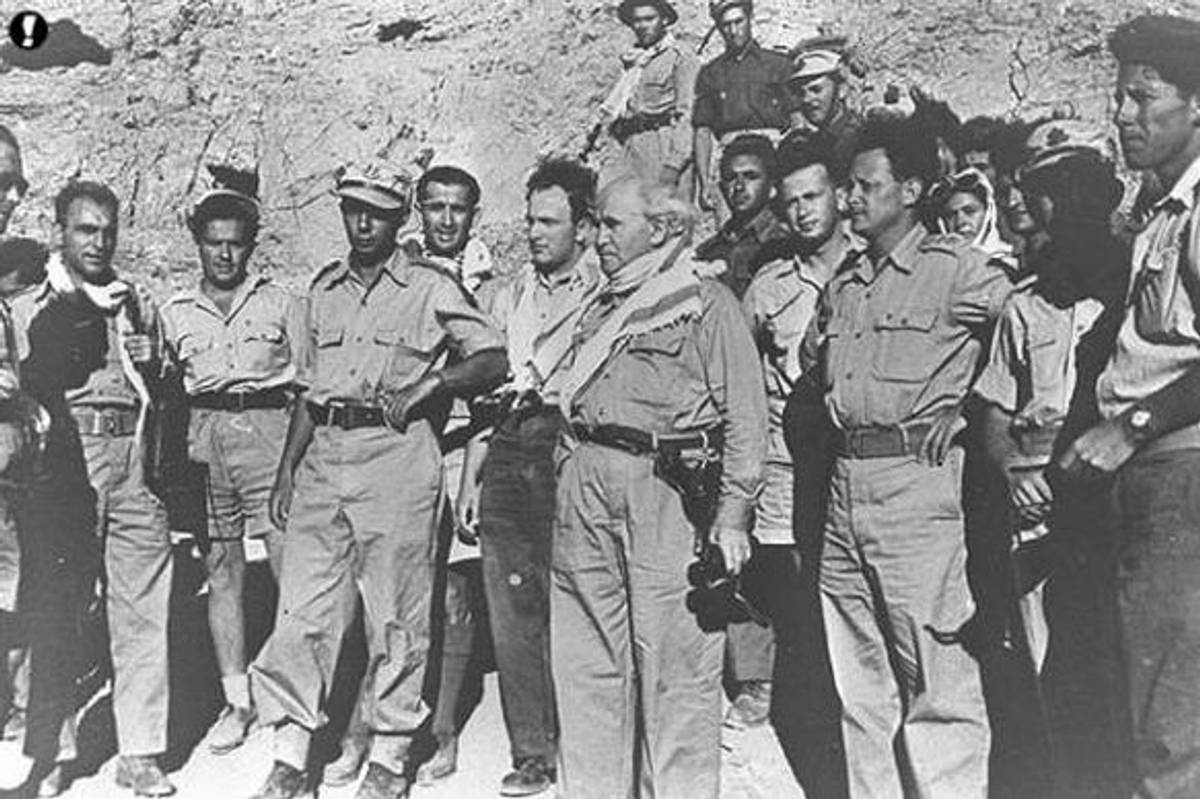The Newly Relevant Case for Liberal Zionism
In the wake of attacks from both the alt-right and the left, what we can learn about the values of nationalism




When Benjamin Netanyahu visited Donald Trump recently, the knives were out—not just for Israeli policy but for Zionism itself. “We don’t want no Jewish state, let’s go back to ’48,” protesters shouted outside Trump Tower in New York. “We oppose nationalism in any form it takes,” Michael Alexander a self-described “Anti-Fascist” marcher told Ha’aretz, “whether it is white nationalism, Christian nationalism here in the U.S., or Jewish nationalism in Israel.”
In a polarized America, too many liberals believe that if Trump loves Israel and they hate Trump, they should hate Israel too. These bash Israel firsters, along with the alt-right nationalists who dare call themselves “white Zionists,” don’t get it. At a time when both America’s and Israel’s leaders often give nationalism a bad name among liberals, a better appreciation of liberal Zionism can help them rediscover nationalism’s true meaning—and value.
Zionism, while not illiberal, has become spectacularly politically incorrect, and not just because of Israel’s relationship with Palestinians. Caricatured as privileged whites, Jews are supposed to join the lofty wannabe cosmopolitans who transcend nationalism. Tribalism is left, condescendingly, to primitive oppressed peoples who must protect themselves or work through their historic pain. This caricature overlooks anti-Semitism’s scarring legacy and continuing toxicity. It neglects, for example, 560,000 impoverished New York Jews, and 50,000 poor, broken Holocaust survivors in Israel alone. It treats the racially diverse Jewish people as “white.” And, most broadly, it dismisses the many benefits that group identities offer, collectively and individually.

Liberal Zionism in the age of Trump can save nationalism from the alt-right’s racist xenophobia and the alt-left’s Leninist cosmopolitanism. Like religion, nationalism is a neutral tool. Although it can foster provincialism, it can also make tribalism transcendent. At its best, liberal nationalism takes the natural tendency to clump together and infuses the resulting communities with democratic ideals.
The philosopher Isaiah Berlin elegantly described constructive nationalism as “awareness of oneself as a community possessing certain internal bonds which are neither superior nor inferior but simply different in some respects from similar bonds which unite other nations.” Many Enlightenment philosophers compared this “desire to belong to a community” with other human “desires” for “food, shelter, procreation and a minimum degree of liberty.” From across the ideological spectrum, Leo Strauss, who taught that “a nation is a nation by virtue of what it looks up to, celebrated Israel as a “heritage” project, what Americans were calling our “roots” by the 1970s.
In his 2011 book The Social Animal, David Brooks of The New York Times describes the scientific basis of what we could call this neurological (not neurotic!) nationalism. “People can distinguish between members of their own group and members of another group in as little as 170 milliseconds,” he writes. Oxytocin, the “affiliative neuropeptide…surges” when people enjoy “close social bonds.” People experience happiness by bonding, making Oxytocin “nature’s way of weaving people together.”
At its best—exemplified in its American and Zionist incarnations—liberal nationalism builds from sharing likeness to spreading goodness. Great Britain’s leading theologian, Rabbi Jonathan Sacks, writes that in his utopian Zionist novel Altneuland, Theodor Herzl’s character Dr. Friedrich Lowenburg “rediscovers his identity” and in so doing, realizes “that to have moral commitments, even an identity, we must first belong.”
We know the movie scenario: someone gets knocked in the head. Waking up, the new amnesiac asks, “Who am I?” Without memory, we lack identity; and without identity, we lack ethical anchors let alone a moral mission—individually and communally.
Today, this vision is countercultural.
Amid epidemic levels of what the sociologist Robert Bellah calls “radical individualism,” young Americans experience a “negative” process of “giving birth to oneself” by “breaking free from family, community, and inherited ideas.” College students not only cut ties—especially in our national, overwhelmingly liberal, elite universities—they denigrate those who remain rooted in the communal cocoon. By contrast, the Jewish notion of the bar mitzvah defines maturation as accepting communal responsibilities not shirking them. The Zionist reality demanding young Israelis enlist in the army also roots them in communal commitments viewing national service as the defining step toward adulthood.
Although Zionism is a version of ethnic nationalism, and American nationalism is a version of civic nationalism, both are mission driven. For both, national identity is not just about being born into the community. Rather, there is a communal sense that through belonging one becomes someone different – more caring, giving, responsible—and in so doing betters the world. David Ben-Gurion identified Zionism’s difficult double mission: Creating a new Jew along with establishing a new Jewish state. His notion of chalutziut, pioneering, deployed the new Jews in that new Jewish state to help the world fulfill Biblical ideals of equality, liberty, and justice. This redemptive nationalism made Israel what the Torah called an “am segulah,” a visionary, enlightened nation. Similarly, from the Pilgrims to Ronald Reagan, from the Framers to Bill Clinton, American nationalism wasn’t about being exceptional for the sake of it, but about feeling exceptional to be aspirational, to stretch, and create that “shining city upon the hill,” inspiring Americans—and the world.

Barack Obama’s frequent apologies for America’s “darker periods” and “arrogance” infuriated conservatives and disappointed many older liberals. Beyond that, the Ivy League cosmopolitanism of Obama had him accepting peers like Ambassador Dan Fried whose disdain for nationalism was disappointingly postmodern. Nationalism, Fried quipped, “is like cheap alcohol: First, it makes you drunk, then it makes you blind, and then it kills you.” Americans traditionally believed that nationalism should be more like spinach is for Popeye, strengthening you by understanding yourself, appreciating “I am yam what I yam,” as the animated sailor-man put it.
Jews survived for millennia by having boundaries, but that revolved around having a set of altruistic values. Our national identity, as realized in Israel, balances ethnic particularism with democratic universalism. Israel doesn’t practice radical inclusion or exclusion; Israel established the Jewish national home while granting rights to all the state’s “inhabitants.” And Israel privileges Jewish immigrants without banning others. If America’s EB5-Visa program can fast-track Green Cards for entrepreneurs who invest $500,000 to create jobs, Israel’s Law of Return can fast-track citizenship for Jews, a people slaughtered when stateless. Moreover, the Jewish state’s Jewishness is not solely religious because Jews are a people too. With anyone able to convert into the Jewish religion and thus join the Jewish people, Zionism is one of the most permeable, least biologically-based, and least racist, nationalisms.
The United States, like Canada, embraces civic nationalism, uniting citizens with different ethnic, religious, racial, and national pasts. This “E Pluribus Unum,” or “one-out-of-many” nationalism, makes both white and black nationalism un-American. Like the European countries and most UN nations, Israel celebrates one particular people. But Israel belongs to the minority of ethnic-based democracies also guaranteeing equal rights to all citizens.
Understanding Judaism, Jewish culture, and Jewish values as the “software” of Jewish national identity highlights how individuals benefit by drawing on their national heritage. Some secular Jews reject Jewish ritual yet infuse their national identities, their Zionism, with an Isaiahan social justice. Just as American nationalists integrated the software of liberal democracy into their national “hard-wired” sense of belonging, Zionism reminds Americans to construct a national identity serving as a storehouse of values and a vehicle for constructive action, as Americans have always done. America has never been a club whose membership status only means sticking with your “own,” or sticking it to others.
While Trump’s embrace may make Israel toxic to his enemies, his now suspended immigration ban on seven Muslim-majority countries may resonate with some Jews scarred by decades of Islamist terrorism. Here, too, Liberal Zionism offers inspiration. Israel fights terrorism by some Muslims while maintaining civil liberties for all. Israel’s President Reuben Rivlin, a right-wing Zionist, has courted the 20 percent of non-Jewish Israelis, mostly Muslim Arabs, embracing every citizen as belonging to “one community,”even apologizing for past “discrimination” and injustices, calling the 1956 Kafr Qasem massacre a “serious crime.”
Despite many challenges, Israelis rank high on various happiness indices because most Israelis find their lives meaningful. Their cosmopolitan provincialism roots them in family, faith, and flag—believing that strengthening one’s inner core is the first step toward becoming internally satisfied and powerful enough to help others. Liberals Americans used to agree that living in a community with shared values and common concerns provided meaning and stoked comradeship, rather than triggering defensiveness and selfishness.
The Zionist duality is rooted in Rabbi Hillel’s powerful paradox: “If I am not for myself, who am I? But if I am only for myself, what am I?” In founding modern Zionism, Theodor Herzl updated that message. In 1896 he concluded his visionary pamphlet Der Judenstat by balancing the personal and the national, the tribal and the altruistic. “We shall live at last as free people on our own soil, and in our own homes peacefully die,” he wrote. “The world will be liberated by our freedom, enriched by our wealth, magnified by our greatness.” This is Thomas Jefferson’s “life, liberty, and the pursuit of happiness” crossbred with Abraham Lincoln’s “better angels of our nature,” delivered with Herzl’s middle European accent.
Zionism, then, offers an alternative, constructive, form of democratic nationalism, believing that nations should stand for something, bound by a sense of the past that enriches the present and builds a better future. Following the Holocaust, many European cosmopolitans decided that nationalism was xenophobia, religion only superstition, particularism merely selfish.
Zionism’s inspiring yet unfashionable reading of universalism and particularism rejects this postmodernist conclusion. In fact, even Emmanuel Levinas and Jacques Derrida, founding gods of postmodernism, appreciated Zionism’s redemptive messianism, embodying what Levinas called the idealistic “beyond of the State.” Zionism understands particularist national identities as the best way to contribute to the broader world. Communities cannot exist without boundaries—and those boundaries often convey values, traditions, memories that help people find meaning—and contribute good deeds, important ideas, innovative technologies, benefitting everyone, far “beyond” one’s own particular national bubble. Alas, more and more American liberals are echoing these trendy oversimplifications. Since the Sixties, cosmopolitans have been seeking a Republic of Everything—open, welcoming, fluid, super-pluralistic. Unfortunately, this Republic of Everything, while admirably accepting, risks becoming a Republic of Nothing, lacking anchors, grounding, values, tradition.
Zionists seek a Republic of Something, a political entity reflecting common ideals and a shared mission, bound by a sense of the past that enriches the present and inspires us to build a better future. Zionism wants nations to pass the “Richard Stands” test, evoking the way young smart alecks butcher the phrase in America’s Pledge of Allegiance—“and to the Republic for which it stands” … Richard Stands.
Nations should stand for something. Nationalism can be xenophobic or expansive, uniting people to build something greater than themselves. This national grandeur flourishes in the liberal nationalism of the United States, Israel, Canada, Great Britain, and yes, Israel. Similarly, religion can be rigid and inhumane, or aspirational and inspirational, stretching us to be better people.
Of course, Zionists and American nationalists don’t always get it right. Liberal nationalism risks generating national self-righteousness and individual hypocrisy. But Ronald Reagan’s Secretary of Education William Bennett endorsed “constructive hypocrisy” because people at least have standards, yearning to be better than what they are, treating their nationalism as a collective dream-catcher. Donald Trump’s nihilistic nationalism eschews the grandiose idealism of previous presidents, preferring to keep America in the defensive crouch he feels the “carnage” internally and externally requires. This destructive defensiveness not only fails to stretch but risks becoming a collective values-killer.
A mere six decades ago—but eons ago in terms of Jewish potency, dignity, and stability—Isaiah Berlin looked at his tattered, shattered, scattered people and praised the miracle of Israel at its most basic. “The creation of the State of Israel has rendered the greatest service that any human institution can perform for individuals,” Sir Isaiah concluded. It “has restored to Jews not merely their personal dignity and status as human beings, but what is vastly more important, their right to choose as individuals how they shall live….” Today, the Jews are stronger, prouder, safer – indeed freer. On the eve of Israel’s 70th anniversary, Zionism seeks a state that is flourishing, filled with individuals thriving, not merely surviving.
Their diagnoses and prescriptions may vary widely, but Israelis, from Left to Right, want to teach the world how to live better, saving the world, and especially the West, from itself. A country like Canada can simply be, flourishing when “peace, order, and good government” are intact. Neither Zionism nor Americanism can function in such a static state. In its defensiveness and offensiveness, in appealing to our base selves rather than Lincoln’s “better angels of our nature,” Donald Trump’s purported hyper-Americanism is deeply anti-American. Similarly, in its torpor and its edginess, in appealing to Israelis’ bunker mentality rather than their messianism, Benjamin Netanyahu’s supposed ultra-Zionism is pathologically un-Zionist.
The golden vision of liberal nationalism flowing from Mount Zion in the Promised Land and the fruitful plains in that other promised land, contrasts with Donald Trump’s Hill Street Bluesian, “do it to them before they do it to you,” defensiveness—the ritualistic squad room warning from that 1980s TV show. American nationalists and Jewish nationalists, from right to left, cannot allow Donald Trump or Bibi Netanyahu to repudiate the optimism of Ronald Reagan and Golda Meir, the idealism of Martin Luther King, Jr. and David Ben Gurion, the righteousness of Abraham Lincoln and Menachem Begin, the ambitiousness of Betty Friedan and Theodor Herzl.
A century ago, Zionism revived pride in the label “Jew”; today, Jews must revive pride in the label “Zionist.” Twelve score and one years ago, America’s revolutionaries gave birth to a new, redemptive form of liberal nationalism; today, their heirs must liberate nationalism from the grip of post-modern cynics and white nationalist bullies. No nationalism is pure, no movement is perfect, no state ideal, but today Zionism remains legitimate, inspiring, and relevant. Zionism offers an identity anchor in a world of dizzying choices—and a roadmap toward national renewal. Americanism can, and does, too.
Ultimately, the challenge for America today is not whom to let in, but who we are; not deciding what criterion to use in immigration policies, but what principles define us. A respectful reading of liberal Zionism can help resurrect a constructive vision of American nationalism too.
Professor Gil Troy, a Senior Fellow in Zionist Thought at the JPPI, the global think tank of the Jewish people, is an American presidential historian, and, most recently, the editor of the three-volume set Theodor Herzl: Zionist Writings, the inaugural publication of The Library of the Jewish People.